Personal and High School Experience
Thaddeus Alden Berryhill is not a person that can be easily defined. The traits he possesses are nonetheless unforgettable, and being a senior at Arvada West High School, Berryhill goes into depth about his journey through the past four years of his life, which resulted in challenges, setbacks and achievements. Now, as he prepares for his future, Berryhill carries with him the lessons learned from his defining years at A-West.
Everyone has different ways of describing their experience in high school. Berryhill describes that his experience can be condensed into these three words: “Fascinating, variable, and long. I feel like I’ve experienced a lot of changes here in the year and how I see the world, and how I build relationships with the people around me.”
For Berryhill, these words reflect the evolving nature of high school, and how each year brings new opportunities for growth. This growth isn’t always about academic achievements or traditional milestones like for most- it can involve discovering quirky, unexpected passions and experiences that can further shape who you are as a person. An example of this is Berryhill’s certification in “rat tickling” from Purdue University. He explains, “It’s a program that they have for graduate students for medicine because they use lab rats a lot, it’s basically a way to simulate rats playing with each other to make them less stressed in the lab.”
What may seem like a humorous or random fact actually speaks to the openness with which Berryhill has approached his high school experience.
Berryhill has found fulfilling activities outside of school that bring him joy and personal growth. He offers captivating insight into how his passions, such as history, have developed outside the classroom.
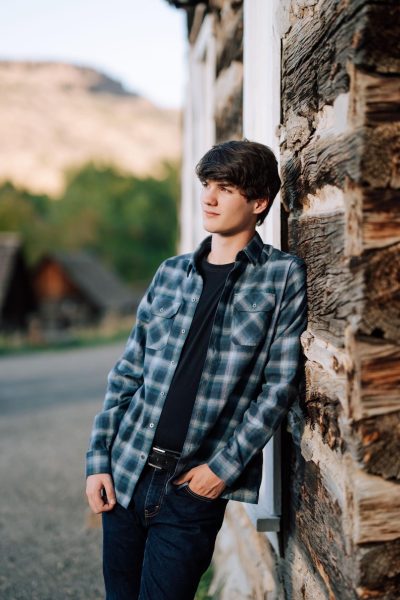
“It’s really interesting because sometimes I see school can be a bit of an obstacle for what I want to do. Because for example I’m autistic, and my special interest, one of them, is history. Recently I’ve developed a far more academic enjoyment of history. I’m trying to find people, professors writing books, dissertations on the subject and that sort of thing. Feeling like I can do all of that outside of school I find so enjoyable.”
Berryhill’s deep interest in history goes beyond what’s expected. His curiosity and drive to seek knowledge outside the classroom enhance his academic success, specifically in difficult classes such as AP Language & Composition. In this class, Berryhill notes one of his proudest moments in high school. “I think the thing I’m most proud of finishing is in AP Lang, you have a satire project, and I wrote my satire project in the style of a medical journal, diagnosing all the symptoms of autism, but instead it was just what neurotypical people consider normal.”
The teacher of his AP Language & Composition class, Angela Dryer, has had an outstanding impact on Berryhill. Berryhill says, “Dryer has certainly been one of the few teachers to truly challenge me and encourage me to think differently. That’s something that I appreciate because it feels like I come into a lot of classes kind of being good at something already. She was a really great person to encourage me to do better and continues to be that sort of person.”
Although Dryer encouraged Berryhill to be his best, she also points out the unique character traits that Berryhill possesses. Having Berryhill in her AP Language & Composition class as well as her AP Research class, Dryer expresses, “He’s a good questioner. He will point out flaws in logic that people don’t like. People that have had class with him before, I think understand that he’s not coming from an aggressive or demeaning standpoint. If more people could embrace that essence of being challenged like Alden does, we would be in such a better spot in society in general.”
Dryer then goes into her first impression of Berryhill in her AP Language & Composition classroom, stunning her. Dryer describes Berryhill as a “walking historian, ” expressing that, “There are a few kids that you will have in your career, I find as a teacher, that they kind of take you aback. Not in a good or bad way, they just kind of shock you. I was like, oh thank God this human is in our room, because as a whole class, we will gain so much more with his additional information, that I myself literally can’t provide, or don’t know how to provide it.”
Since Dryer has had Berryhill as a student in two classes, she has seen him grow exponentially as a student. She specifically mentions, “So what I’ve seen from Alden, is that he’s more willing to hear and gain perspectives and be questioned. I’ve seen that a lot in AP Research. It’s really hard for him, but he’s really grown in his ability to say, ‘I don’t know everything, but that’s okay.’”
Another teacher who has seen Berryhill grow has been John Gallup, his Berryhill’s former Contemporary U.S. Issues and AP United States History Case Studies teacher.
With Gallup having Berryhill in multiple of his classes, Gallup has seen Berryhill strive in the classroom by explaining, “He was the first with his hand up, and always engaged, and wasn’t shy about sharing his ideas and his opinions right or wrong. It didn’t make any difference, which is exactly what I want as a student.”
With a student as engaged and determined as Berryhill, Gallup describes his work ethic as being “second to none,” and notes that the discussion-based class is “part of what makes him a good student.”
Teachers can serve an incredibly important role in high school, but friends are just as special to Berryhill. Berryhill reflects on his friendship with senior Gabriel Faulkner, who he has been friends with since fourth grade, and explains that, “I can’t really imagine doing anything without him knowing about it.”
Knowing him for so long, Faulkner comments on Berryhill, saying that he is a, “very morally driven person,” who has, “very strong beliefs.” Faulkner also adds that it’s something he admires about Berryhill, and that, “he wants to make a difference.”
As Berryhill elaborates on who some of his best friends are, Rosalia (Rosie) O’Dorisio is mentioned as someone who is supportive and understanding to Berryhill. Reflecting on both of these friendships, Berryhill says that, “They’re both super supportive, they understand my needs. They don’t talk down to me or anything, they don’t make assumptions about me, or my disabilities and they just treat me like a person, and I really appreciate that.”
O’Dorisio echoes this by adding, “I would say he’s really supportive, too. He’s come to every show (theatre) that I’ve been in, including improv, and he just makes a point to check in when theatre gets to be a lot. We do that for each other, like when I know he’s having a rough day.”
This mutual support is one of the things that makes their friendship unbreakable. O’Dorisio then comments on ways she would describe Berryhill such as, “I don’t want to say confident, but he is very confident. He’s very sure of himself, and it’s very inspiring to see because he knows what he wants, and he knows how to get it. He’ll always do what he needs to do to show that.”
Politics and Academic Interest
Berryhill has explored his in-depth interest in politics and history during his time in high school. Berryhill explains how his interest in history sparked his passion for politics by remarking, “As I stated previously, one of my special interests is history. I’ve been into it since the second grade, and when you really dig into that, you realize that politics and history are inseparable. You just cannot divorce them from each other. And additionally, being autistic, my parents encourage me to want to understand the perspectives of other people.”
Berryhill has also used his understanding of history to find hope within our society, stating, “ I feel like with what I’ve learned, you shouldn’t give up hope that things might seem bad now, but we are products of centuries of development, and thousands, if not millions of people constantly spent every day hoping that tomorrow would get better, and that the sun would shine a little brighter for their kids than it did for them, and I feel like I should continue carrying that torch, that someday I might get to live, or my children might get to live in a world that’s truly just.”
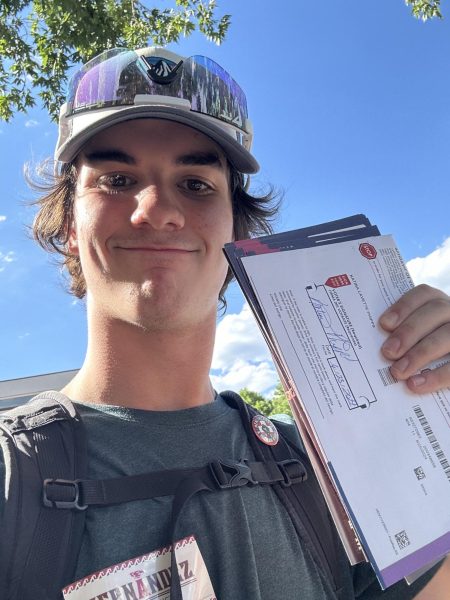
Some inspirations of his that further fueled his fascination with politics come from historical figures, as well as modern-day individuals. He specifically mentions an interest in Karl Marx, that led him to become involved with the Denver chapter of the Democratic Socialists of America. He was then a volunteer canvasser for Tim Hernandez’ election campaign.
As Berryhill mentions who his role models are in the political/historical realm, he explains what drew him to their philosophies. Some of the people he looks up to in the history realm are anarchist, Marxist people who, “really dedicate their lives to trying to achieve a better tomorrow.”
Berryhill also mentions that John Brown is someone he particularly looks up to. Berryhill says that, “He was a white man who consecrated his life to the destruction of slavery, and people at the time thought he was a madman, kind of like how people now look at serial killers and are like, why would they do that? They couldn’t have possibly understood why somebody would do something like that for humans that they didn’t even consider to be human beings. It was unthinkable, and therefore he was a madman. But he was right.”
Another area in which he excels academically is inside his AP Research class, where his topic goes into restorative practices, and its implementation with the hiring of staff dedicated to implementing those practices.
From learning lots in this course, Berryhill provides some advice that would be applicable to underclassmen thinking about taking AP Research. “Be ready. It’s going to be a lot of work. Pick something that you’re truly passionate about. Be ready to hit roadblocks, and be able to process that and be like, ‘okay, I’m sitting here, I’m stressed, I want to give up, how do I keep moving forward?’”
Through his experience in AP Research to his broader school journey, Berryhill describes how he sees his interest in politics shaping his future goals and aspirations. “College can also serve as that second opportunity. You know, test things out, try things out like high school. I want to get involved with union organizing and see what that’s all about. That would be something for me to dedicate my time to politically. I could also maybe continue to work on political campaigns like if Tim Hernandez chose to run again, I will certainly reach out to him as soon as I can,” per Berryhill.
Outdoor and Skiing Passion
Even though Berryhill shows his exceptional smarts in many ways at school, he continues to exhibit his talents and enjoyment through skiing, hiking, and rock climbing. Berryhill reflects on what first drew him to nature and the outdoors, explaining how his interest began and evolved over time.
Berryhill explains how he is, “one of those people who was privileged enough to have a family who could grow up doing that.” Berryhill was actually born in Oklahoma, and at that time, his dad was finishing college for his degree in architecture. Afterwards, “it sort of took a few years for him to find a place he really wanted to work at, which was Denver.”
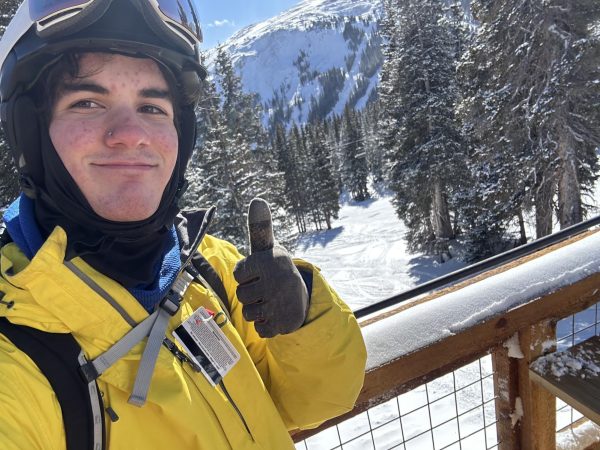
Berryhill then reveals how his parents ended up eventually deciding on Denver to live in by explaining, “They came to Golden, visited, ate a sandwich at my family’s favorite restaurant D’deli, and decided right then and there, looking at the mountains and seeing how beautiful it was, we’re going to raise our family here. From then on, we lived in Colorado,” Berryhill reveals.
Throughout his parent’s admiration of the state of Colorado, Berryhill explains that he now has a better understanding of why he appreciates the outdoors, opposed to when he was younger. Berryhill suggests that, “ it’s sort of something that’s just been a part of me. When I was younger, I used to actually not really like hiking or really appreciate it. I just didn’t see the appeal. I was always like, I’m not going somewhere just to look at a thing from a different angle. But now, I just like the quiet of it all. I’m older and I have a lot more energy and endurance, and stepping over rocks that seemed impassable when I was a toddler. Being able to be out there in the quiet and the peace of that sort of aspect is so fun. Also, with things like skiing, mountain biking, rock climbing, the ability to get that sort of adrenaline hit to push myself to do something that I measurably can know I’m better at.”
With this found appreciation of the outdoors, he shares a sincere anecdote of his skiing journey, sentimental to his family. Something special with his family is that his grandfather enjoys doing all of the outdoor activities with Berryhill and the rest of his family. His grandparents ended up moving to Colorado a year or two after Berryhill did, solely to spend more time with them.
Berryhill knows that even though outdoor activities he likes to participate in can be shared with friends and family, he reflects on how much of a role nature plays in his daily life and overall well-being.
“It can help me decompress in that sort of thing if I’m really stressed out. Also just knowing that there’s somewhere quiet I can step away just a few minutes away from my home. I get overwhelmed by lots of conversations and loud noises very easily, and just knowing that there’s somewhere I can go and just be content, and be.”
Future Aspirations and Reflection
As Berryhill looks back upon the person he has become, he shares some of the most important things he has learned along the way. Berryhill states, “Being self-reliant isn’t really what you should be aiming for. You should be able to manage time and have all those skills on your own, but definitely being able to reach out and say, ‘Hey, I need help’ ‘I need support doing this’, or, ‘Can you give me feedback on this’, that’s definitely an even more important skill.”
After emphasizing the importance of collaboration, Berryhill switches his attention to the future approaching it with the same mindset. Berryhill shares his future plans explaining, “I’m planning on going to MSU (Metro State University) for my first year of college. I just kind of want to stay somewhere local so it’s not too much of a shift or a change. I’m also trying to apply for the Ascent Scholarship, so if I end up getting that, that’ll be great for my first year of college and just really trying to break into the academic study of history. And even if I don’t end up doing that as a career, I’d still really enjoy it and know a lot about history just for fun.”
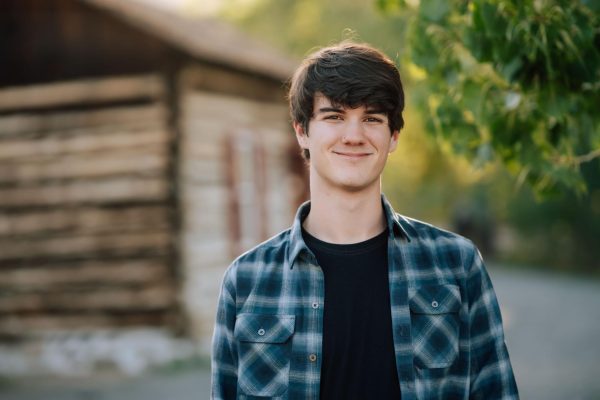
After outlining his goals for college and beyond, Berryhill also took time to consider what he may have done differently in high school. Berryhill thinks that he has let some people, “…in the way they treat me, to a degree, that’s somewhat unfair to myself just because I feel like I’m under more pressure to fit in than other people, because of my disabilities, because I have autism. I feel like the conclusion I’ve come to is that I’m fine with who I am, and other people can take it or leave it pretty much.”
And finally, to wrap it all up, Berryhill offers his advice for incoming freshmen, about to embark on the high school experience. “Your options will open up as soon as you walk out those doors on graduation day. This is sort of an opportunity for you to test what you like, to see what you’re interested in and see what kind of person you’d like to be. Life is long, and you have a lot of time to figure things out. This is a time for you to grow and develop for the first time really on your own to see what you want to do. And understand that if you ever feel stuck, if you ever feel trapped, it really will get better.”
Advice from Others
Angela Dryer:
“Breathe. Straight up, breathe. Alden gets so in his head, and he gets so worried, and he sees all the issues, and I mean all the issues, and God love his heart, hugely empathetic. He sees the problems and wants to write them, and wants to call them out, and there will continue to be problems. When you’re someone like Alden who can see everything, you can be crushed by the weight of it. You can feel so defeated at times; there are so many people that don’t listen. I’ve known him since junior year, people do not like being called to the line, and I love that he continues to do so. I want him to keep doing that because we need people to pressure, we need people to question the norms. We need people to call people out when they are being absolutely inappropriate, and demeaning, and they are making fun of people for their differences as Alden has been made fun of for his differences. Inclusive groups that are supposed to build you up have torn Alden down, and yet, Alden remains. Which baffles me. I want to see him continue to shove and push, but with someone who is as passionate as him, it will either invigorate his entire life, or he will always feel this pressure that he’s never doing enough, but he actually is. I want him to breathe.”
John Gallup:
“Don’t stop doing what you’re doing. When he gets into college, he might have to temper his positions a little bit. When you’re debating, or discussing stuff with other college students in maybe a social atmosphere, it might be time to temper some of the ways he says things, tone it down so he’s not intimidating people. I mean, you know, he is an outspoken young man. There’s no question about that, but that’s awesome. Just because you’re outspoken doesn’t mean you can’t do it without respect and consideration, and other people have different thoughts than you have.”
Rosie O’Dorisio:
“One piece of advice I already give him is keep your head up, and just keep being you. Because he’s so great, he’s so awesome, he’s just got to remember to just keep being confident in himself, and keep teaching people.”
Gabriel Faulkner:
“I would just say don’t get deterred by other people’s views and by the state of the world. I would just say, you know, stay true to yourself and stay true to what you believe in.”


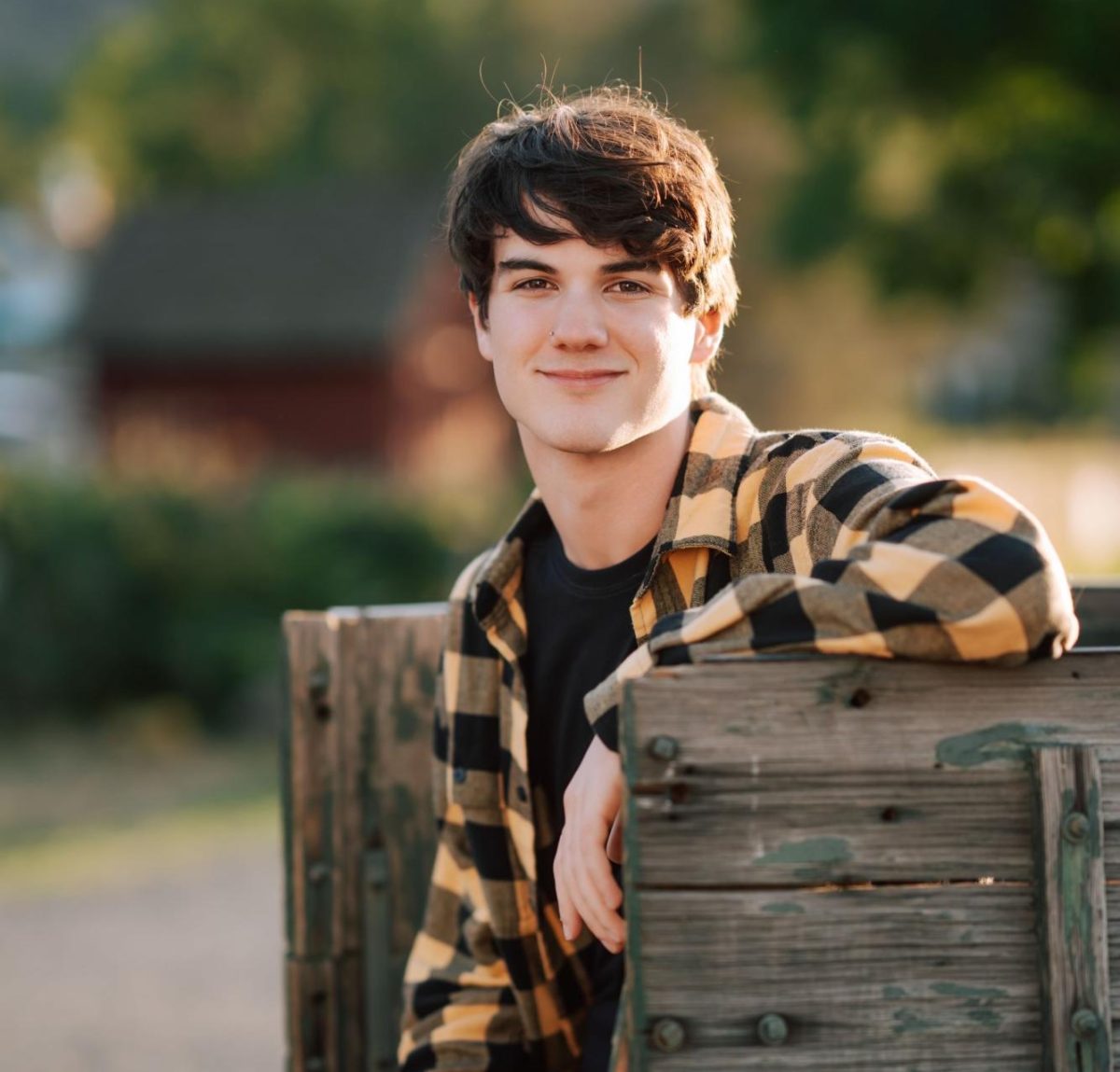
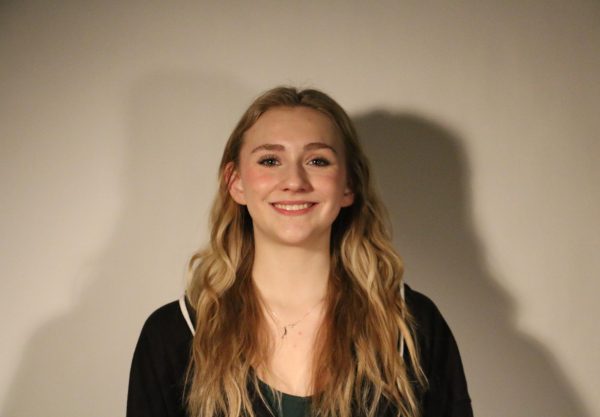
Rose Cameron • Apr 19, 2025 at 9:31 pm
Great piece of work!! Interesting and in depth